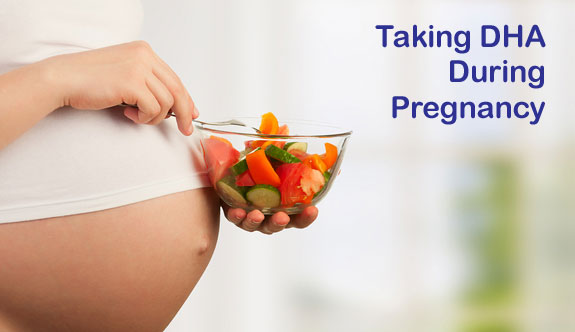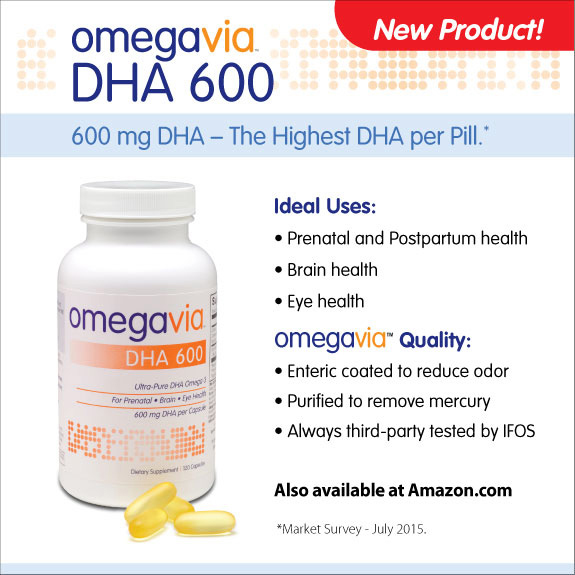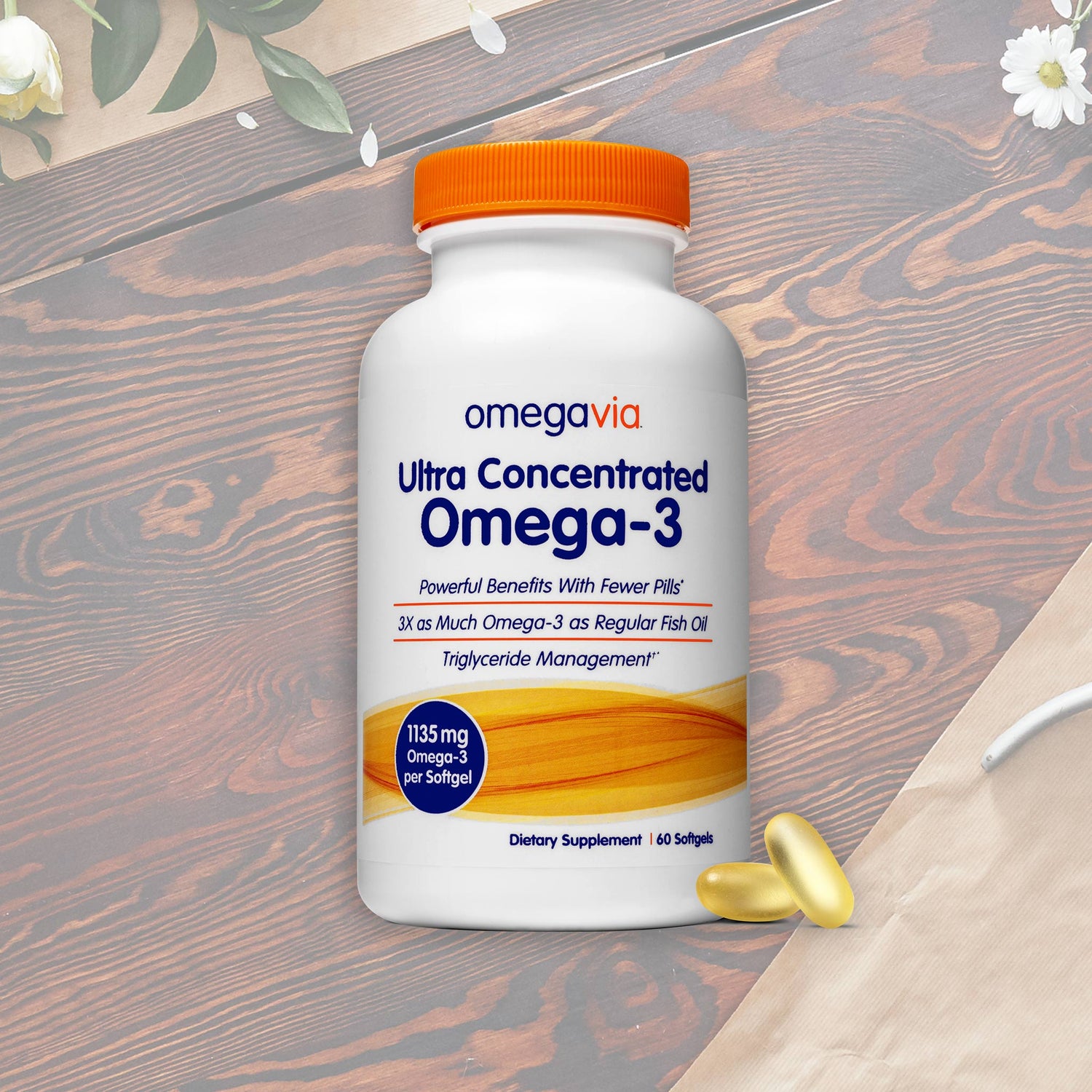 Taking DHA Omega-3 during pregnancy is critical if you are not eating wild caught seafood several times a week. DHA is critical for your baby's brain and eye development. Your need for it increases through the course of your pregnancy.[/caption]
As a nutritionist who has been studying fish oil and Omega-3 for over 20 years, it’s time to practice what I’ve been preaching for so long.
I used to have a very hard time convincing pregnant women that they should take fish oil or eat fish.
It was a tough sell.
Women had been scared to death about the dangers of mercury in fish.
In the 80's, we started avoiding the sun.
And in the 90's, we started avoiding seafood. Thank you, TV. But things are changing.
Taking DHA Omega-3 during pregnancy is critical if you are not eating wild caught seafood several times a week. DHA is critical for your baby's brain and eye development. Your need for it increases through the course of your pregnancy.[/caption]
As a nutritionist who has been studying fish oil and Omega-3 for over 20 years, it’s time to practice what I’ve been preaching for so long.
I used to have a very hard time convincing pregnant women that they should take fish oil or eat fish.
It was a tough sell.
Women had been scared to death about the dangers of mercury in fish.
In the 80's, we started avoiding the sun.
And in the 90's, we started avoiding seafood. Thank you, TV. But things are changing.
So is it safe?
Yes. Absolutely! My pregnant wife takes 4 ultra-concentrated fish oil pills every day. (See her dosage details below) After working in the fish oil industry for almost 20 years, I know the risks. The risk is not fish oil. The risk comes from NOT eating fish or taking fish oil. Let's be honest - no one eats enough fish. So your baby's Omega-3 needs has to come from supplements. Not consuming enough DHA Omega-3 can lead to poor development of your baby's brain and eyes.* Pregnancy is not the time for discount fish oil. Algae-DHA and Ultra-concentrated fish oil are definitely cleaner and purer than regular drug store fish oils. And the peace of mind is worth the added cost.The Truth About Mercury and Fish Oil during Pregnancy
The truth is, fish meat has mercury. Fish oil does not. I’ll explain why in a second. First, here are the fish to avoid: tilefish, shark, swordfish, and king mackerel. These fish are large predatory fish that live for many years, which gives them a chance to accumulate mercury in their bodies. Canned tuna and Halibut can also be high in mercury.
Fish Oil During Pregnancy:
OmegaVia is NOT a prenatal supplement. OmegaVia is perfect for you, mommy. But for baby, we recommend that you take a high-DHA supplement. We also make OmegaVia DHA 600.
What’s safe to eat during pregnancy? Sardine and wild pacific sockeye salmon are both excellent.
Fish oil does NOT contain high levels of mercury.
Even the cheap, low-quality fish oils have virtually no mercury. Why? Because of three reasons:- Methyl mercury, the form of mercury found in fish is not soluble in oil. The mercury is separated from the fish when the oil is extracted.
- The molecular distillation process used to make fish oil ensures that virtually all the remaining mercury in the crude oil is permanently removed.
- Good quality fish oils are made from small fish that are low on the food chain. These fish don’t have toxic levels of mercury to begin with.
Fish Oil During Pregnancy - Why is it Important?
Omega-3 in fish oil is very important in the development of your baby’s brain and eyes. More than half of your baby’s brain and eyes are made of DHA Omega-3.
Fish oil during pregnancy helps support: |
|
How much fish oil during pregnancy?
Ten years ago, scientists said 300 mg of DHA should be the minimum. This is why the DHA pills your OB/GYN office gave you contain 200 to 300 mg DHA. But what scientists know about fish oil and pregnancy has changed in the last 10 years. Now, the latest consensus calls for a MINIMUM of 900 mg DHA per day. And that just covers the basic, bare-minimum needs for your baby and your body. 900 mg DHA is the new minimum. Turns out 90% of pregnant women were not even getting 300 mg a day. Then why does your prescription prenatal have only 300 mg DHA? Well, their dosage is based on old science. Drug companies and the FDA are very slow to react to new science. Here’s what some of the popular prenatal supplements contain:- Expecta: 200 mg DHA per pill
- Prenate: 300 mg DHA per pill
- Prenexa: 300 mg DHA per pill
- CitraNatal: 300 mg DHA per pill
- Duet DHA EC: 295 mg DHA per pill
- NatureMade Folic Acid with DHA: 50 mg DHA per pill
Not enough! Not even close!
NatureMade Folic Acid with DHA contains ONLY 50 mg! That's crazy! There could be pregnant women taking this product and thinking that their DHA needs are covered. Not even close! Don't be that woman!The issue with Folic Acid
While I'm ranting about low DHA levels in prenatal supplements, let me rant about Folic Acid for a second. Pregnant women need this B vitamin because most of us don't eat enough green leafy vegetables. We think taking Folic Acid will fix that problem. It won't. Almost 90% of Folic Acid is not absorbed. Green leafy vegetables have Folate. Not Folic Acid. Folic Acid is synthetic and not absorbed. Well, just enough of it is absorbed to prevent spinal health issues with babies. So if you want to really be good, eat green leafy veggies (a lot!) and supplement with FOLATE. Look for brands that use Metafolin or Quatrefolic. You won't find Folate in any of the samples your doctor gave you or in the other prenatals.Back to DHA Omega-3...and here's what my lovely wife took during her pregnancy:
- Two OmegaVia pills = 2210 mg Omega-3 (520 mg DHA)
- Two Carlsons Super DHA Gems = 1000 mg DHA
NEW! OmegaVia DHA 600 - - the only pill that provides enough DHA for the second half of your pregnancy
- Contains 600 mg of DHA Omega-3 per pill
- Enteric coated to reduce odor and burps
- Purified to remove mercury.
- Always third-party certified for your peace of mind

Other nutrient deficiencies to watch out for:
- Vitamin D3. Get plenty of mid-day sunshine. If you're pregnant during the winter, please take a supplement. Have your OB check your levels.*
- Magnesium. Most Americans are deficient in this mineral. Even if you eat a very good diet, you are going to be low in this nutrient. Eat more veggies, nuts and seeds.*
- Vitamin K2. Eat more European style hard cheeses like Jarlsberg, Gouda and Emmental. If you can't find these cheeses, eat any real cheese. K2 is important for your baby's facial, jaw, head and teeth development. Your baby's teeth, even their adult teeth are developed by week 11 of pregnancy. In other words, it is very hard to make good looking children without enough K2. I'd rather you get your K2 from cheese.*
- Iron. Half of all pregnant women are iron deficient.
- Choline. 90% of Americans do not get enough choline and it is crucial during pregnancy. I have no idea why DHA gets all the attention but choline does not.
- B-Vitamins. You already know you need Folate (Folic Acid). Folate is a type of B Vitamin. If you're a vegan or vegetarian, please consider taking a really good B-complex long before you get pregnant. If you're considering becoming both a vegan and mother at the same time, stop. Don't do it! Women don't bother taking prenatal vitamins BEFORE pregnancy, but that's when you need it most! Only 30% of women take prenatal vitamins BEFORE pregnancy.
- Iodine. Most pregnant women are marginally iodine deficient. Iodine is necessary for producing thyroid hormone, which is necessary for proper brain development. Shockingly, only half the prenatal vitamins (as of 2009) contained any iodine. And of the half that had iodine in the formula, less than half provided enough iodine. This is why I'm so disappointed with most prenatals. I suggest you get 500 mcg to 1000 mcg per day.*
Your turn...
- Are you taking a prenatal DHA? If so, how much?
- Has you OB tested you for Vitamin D levels?
- Did you take B-complex vitamins before pregnancy?
- Do you take DHA in addition to what's in your prenatal?



